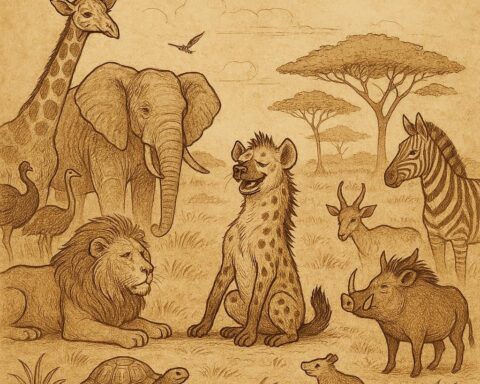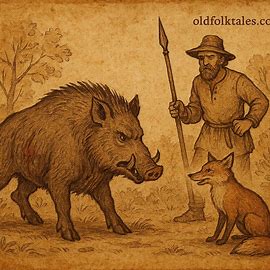Long ago, in the warm lands of Angola, there lived two unlikely friends: Kabidibidi the young leopard and Kabidibidi the young goat. Though one was predator and the other prey, the two shared laughter, games, and companionship. Each day, their bond grew stronger, yet beneath their innocent play lingered the shadow of danger, for their friendship was fated to be tested by cunning and survival.
Kabidibidi the young goat once said, “My friend, come often to my house so we may spend our days together.”
But Kabidibidi the young leopard replied, “I cannot always go to your home. When my father leaves for the fields, he commands me to stay at the threshold to watch over the house. Instead, you must come here.”
The goat agreed, and so it was decided.
From that day forward, Kabidibidi the young goat visited the leopard’s home. They played together until the sun slipped beyond the horizon. Then the goat returned to his family, and each night he rested, only to repeat the visit again the next day. Their lives followed this rhythm, friendship filling the daylight hours.
READ THIS: Leopard and the Other Animals | An Angolan Folktale
One day, Kabidibidi the young leopard confided in his father:
“Father, each day Kabidibidi the young goat comes here. We spend our time together in play.”
But Mr. Leopard frowned and answered sternly:
“My son, you are foolish. Do you not know the goat is our food, the meat we live upon? Why do you let him go free? Catch him, and we shall feast.”
He handed his son a sack and instructed him:
“When he comes, say to him, ‘My friend, let us play. Climb into this sack for our game.’ Once he is inside, bind the sack tight, take a staff, and strike him until he is dead. Then we shall eat him.”
The young leopard obeyed, and when his parents left for the fields, he prepared the sack.
Soon the goat arrived, and they played as usual. At last, the leopard presented the sack and said, “My friend, climb into this sack so we may play a new game.”
The goat, trusting, entered. The leopard bound the sack tightly.
After a while, the goat cried out, “My friend, let me out!”
But the leopard refused.
The goat tried again, “Let me out, or else I shall pee inside.”
“Then pee,” said the leopard.
“I shall mess inside,” threatened the goat.
Horrified at the thought of his father’s sack being soiled, the young leopard relented, untied it, and let the goat out. The two resumed their play, and when evening came, the goat went home safely.
When Mr. Leopard returned from the fields, he asked, “Where is Kabidibidi the young goat?”
His son replied truthfully, explaining how he feared the sack would be ruined.
“You are a fool,” growled Mr. Leopard. “Next time, tell him to do as he pleases inside. The sack is mine, and it can be washed!”
The following day, the young goat returned earlier than usual. Hearing the leopards’ plan, he crept quietly to hide behind the house until Mr. and Mrs. Leopard left for the fields. Then he joined his friend to play once more. Again, the leopard convinced him to enter the sack.
But this time, when the goat was released, he said slyly, “Now, my friend, you too must climb inside so we may play equally.”
The trusting leopard entered. The goat tied the sack tightly.
The young leopard pleaded, “Let me out.”
But the goat answered, “Stay longer.”
“I must pee,” cried the leopard.
“Then pee!” answered the goat.
“I must mess,” begged the leopard.
“Then mess!” the goat replied coldly.
Taking a heavy staff, the goat struck the sack until Kabidibidi the young leopard lay dead.
Cunningly, the goat disguised himself. He lay in the bed of Mr. Leopard, covering himself with the sheet, and spoke in a weak, childlike voice when the father returned.
“Where are you, my son?” asked Mr. Leopard.
The goat whispered, “Here I am, Papa. My head aches me. I killed Kabidibidi the young goat and put him in the sack. Do not untie it.”
Believing these words, Mr. Leopard and his wife boiled a great pot of water and placed the sack inside, cooking the body of their own son.
Later, when the meat was ready, Mr. Leopard called, “Come, my son, let us eat.”
The goat replied, still feigning illness, “Bring my portion outside, Papa, for the house is too hot.”
They gave him the food, and covering his head with the sheet, Kabidibidi the young goat slipped away. From a distance, he shouted back,
“O Mr. Leopard, you thought yourself cunning, but you have eaten your own son! I am Kabidibidi the young goat, and I escape alive!”
Mr. Leopard rushed out in fury, but the goat was already gone, swift and far. From that day, it is said, leopards have hated goats, for the young goat deceived him and caused him to eat his own child.
And so, ends the tale.
Moral Lesson
This folktale teaches that blind trust can be dangerous, and cunning may overcome strength. The young goat survived by using wit against both father and son, while the leopard family perished through arrogance and misplaced confidence. True wisdom lies not in force or deception, but in recognizing when pride blinds us to danger.
Knowledge Check
1. Who were the main characters in this Angolan folktale?
The young leopard Kabidibidi, the young goat Kabidibidi, and Mr. Leopard.
2. What plan did Mr. Leopard give his son?
He instructed him to trap the goat in a sack, bind it, and kill him with a staff.
3. How did the young goat escape the first time?
By threatening to soil the sack, which frightened the young leopard into releasing him.
4. How did the goat trick the young leopard into the sack?
He insisted that his friend take a turn inside after being released himself.
5. What ultimate trick did the goat play on Mr. Leopard?
He disguised his voice, convincing Mr. Leopard he was his son, causing the parents to cook and eat their own child.
6. What is the central lesson of this folktale?
Cunning and cleverness can outwit brute force, but pride and blindness to truth bring ruin.
Source: Kimbundu folktale, Angola







